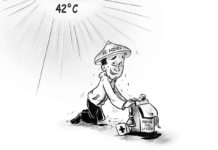[av_one_full first min_height=” vertical_alignment=” space=” custom_margin=” margin=’0px’ padding=’0px’ border=” border_color=” radius=’0px’ background_color=” src=” background_position=’top left’ background_repeat=’no-repeat’ animation=”]
[av_heading heading=’Modern slavery’ tag=’h3′ style=’blockquote modern-quote’ size=” subheading_active=’subheading_below’ subheading_size=’15’ padding=’10’ color=” custom_font=” av-medium-font-size-title=” av-small-font-size-title=” av-mini-font-size-title=” av-medium-font-size=” av-small-font-size=” av-mini-font-size=” admin_preview_bg=”]
BY IKE SEÑERES
[/av_heading]
[av_textblock size=” font_color=” color=” av-medium-font-size=” av-small-font-size=” av-mini-font-size=” admin_preview_bg=”]
January 22, 2018
[/av_textblock]
[av_textblock size=” font_color=” color=” av-medium-font-size=” av-small-font-size=” av-mini-font-size=” admin_preview_bg=”]
BASED on available references, “compelled labor” appears to be the most definition of modern slavery, as we know it today.
“Human trafficking” also appears to be a closely related term, wherein it is implied that those who are “trafficked” are “compelled” to do work against their free will, and as a matter of fact, to do work in places that against their free choice.
Of course, it may just be a matter of semantics, but the term “compelled labor” is also closely associated with two other terms, namely “involuntary servitude” and “forced labor.”
Well, we may be struggling with the true meanings and interpretations of these words, but fortunately for us, we do not have to suffer the real pains brought about by these illegal practices.
Pardon my extremely liberal interpretation of these terms, but I happen to think that one way or the other, many of our compatriots who are working abroad as domestic helpers may actually be considered as “modern slaves”, simply because they have been “compelled” to work under those conditions.
Of course, it could be said that having ended up in those conditions have been the result of “voluntary” processes, but still it could not be denied that what they are doing is plainly and simply “servitude” no matter how you look at it, because they are clearly working as “servants”, rather than as “professional employees” or better still, as “service providers.”
Of course, I might be talking figuratively, but to put it in very layman terms, it would appear that these compatriots of ours could practically be considered as “modern slaves.”
Certainly I would not say that this observation does not apply to everyone in general, but then again it could be said that generally speaking, it is more of the rule rather than the exception. Where there are some doubts as to whether these compatriots of ours were able to exercise free will in their choices or not, what we are really sure about is that these compatriots who are forcibly transferred from one country to another in violation of their contracts are in effect victims of “human trafficking.”
It may be too tempting for us to think that modern slavery happens only to our compatriots who are working abroad, but the fact is, modern slavery is also happening here at home too, right under our own noses.
We may not have noticed it because it has been going on for so long in so many places, but many of our farmers could already be considered as “modern slaves”, simply because they could already fall under the category of “bonded labor”, regardless of whether they are aware of it or not.
You might say that this is just a play of words or that this is just a “de facto” scenario, but those farmers who are forced to sell their harvests at rock bottom prices to the middlemen are in effect “bonded” to this unfair equation.
As it has been happening for so many generations, many farmers are borrowing money from many middlemen for their working capital and for their personal expenses, at very high interest rates.
In theory, it would have been easy for these farmers to pay back their debts for as long as they are earning from their harvests, but as it usually happens, the middlemen always end of paying the lowest prices and in doing so, nothing is practically left to the farmers, so much so that they have no choice but to borrow money again from the middlemen.
In theory, these middlemen are actually playing an important role in the overall supply chain, but in reality they perpetuate the problem if they do not pay the right prices.
If you are the kind of person who you are supposed to be, you will probably be working towards a solution that would end “modern slavery”. As I see it however, I see the signs that would make it a thing of the past.
Of course, the scenario of that not happening surely worries me, but what is really my main concern right now is to punish those who are the “modern slavers” of our time, so that they could no longer do what they are doing, and so that slavery in its many ancient and modern forms would die, along with those who are guilty of perpetuating.
While I would like to be more optimistic for my own good, I could not help but wonder we could create awareness for these problems, in a sea of people who could not see the problem even if it is right under their nose.
Perhaps not coming out as an issue in the open is the virtual slavery of not only our Overseas Filipino Workers who are working as domestic workers abroad, but also of the domestic workers who are working locally. Some might argue that they are not really slaves because they are paid some salaries, but then again it could be said that what they earn is not enough for the work that they put in, usually on a 24×7 basis.
Some might say that they are not slaves because they are employees, but the argument goes downhill if they are treated as slaves for all intents and purposes. It seems that the operative word here is “forced”, meaning to say that if they are “forced” to work under those conditions, they are practically slaves for all intents and purposes. (iseneres@yahoo.com/PN)
[/av_textblock]
[/av_one_full]



